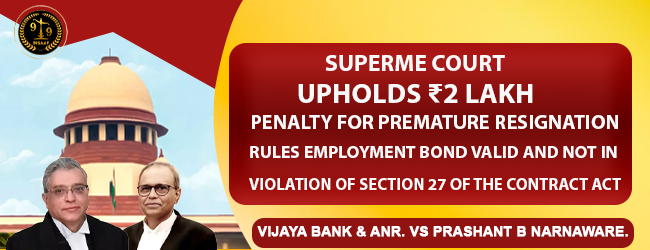2025-May-17

The Supreme Court Stands by Employment Bonds, with Important Outcomes.
Employment bond clauses requiring a minimum service period were found to be valid in a recent judgment by the Supreme Court of India. The case focused on a public sector bank getting back ₹2 lakhs from an employee who left before serving the entire three-year period.
The court stated that as long as an employment bond is fair and reasonable, and does not last longer than the term of employment, it does not go against Section 27 of the Indian Contract Act, 1872.
Key Points from the Judgment:
No Limits on Trade: According to the Court, only those minimum service clauses that last during the employment phase and not after someone is fired are acceptable.
Fair & Reasonable: The steps and consequences of bonds must be fair for them to be enforceable.
Compensation Allowed Under Section 74: Companies can get compensation for a breach of contract, but the amount should reflect the actual damage suffered or a fair forecast.
Specific Performance Not Permissible: Forcing an employee to stay on the job is not allowed; Under Section 14 of the Specific Relief Act, 1963, specific performance of personal service contracts is forbidden.
Public Policy Not Violated: Courts saw that inclusion of such bond clauses does not conflict with public policy as long as they are used to protect true business interests such as costly training and keeping staff.
Overturning High Court: The Court found the High Court erred by relying on a previous case without considering the available facts, particularly the bank's arguments regarding financial loss from recruitment processes
As a result, employers and employees now have a better understanding of the legal status of employment bonds and are guided to ensure fair terms in their contracts.
What can the Legal Experts do for you? Our team of lawyers is ready to help you in minutes with any legal question.
 Whatsapp
Whatsapp
 Toll Free :-
1800-212-9001
Toll Free :-
1800-212-9001